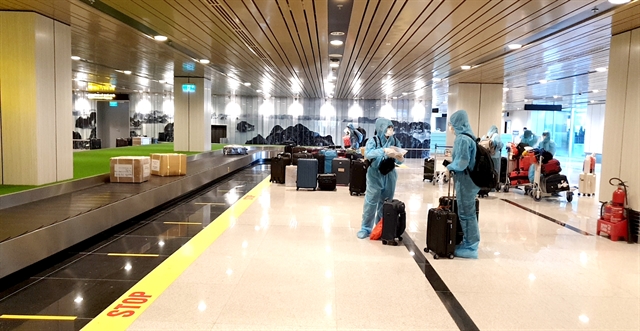 Society
Society

Việt Nam is advised to carefully operate the vaccine passport programme, which is designed to ensure people’s lives and maintain economic growth.

|
| Vietnamese citizens returning from Japan at Vân Đồn International Airport on September 4 in the north-eastern province of Quảng Ninh.— VNA/VNS Photo |
HÀ NỘI — Việt Nam is advised to carefully operate the vaccine passport programme, which is designed to ensure people’s lives and maintain economic growth.
Phạm Ngọc Sáu, director of Quảng Ninh Province’s Vân Đồn International Airport, said if the programme was run properly and in compliance with safety regulations, it would be an effective tool to help in restoring economic growth, especially in tourism-related sectors.
If not, the programme would not only fail to maintain economic growth but also create a new wave of COVID-19 in the country, he said.
Vân Đồn International Airport was the first airport in the country to pilot the vaccine passport programme since September 4 when 297 Vietnamese citizens with vaccine passports returned from Japan.
Sáu also suggested that Việt Nam should learn and draw lessons from other countries, which already run the programme, to build the country’s own policies and effectively apply the programme.
It would be necessary to prepare plans for COVID-19 pandemic prevention and control in the “new normal” with specific measures, he said.
For example, the measures had to clearly regulate which vaccine passports would be accepted in Việt Nam and passengers had to carefully check their vaccine passports at the departure airport before flying to Việt Nam, he said.
The vaccine passport programme should be implemented in several phases, he said.
First, it should be piloted to receive Vietnamese citizens with vaccine passports in airports of provinces and cities in green zones and then rolled out across the whole country, he said.
Green zones mean pandemic-free zones which are considered safe areas, with no cases or risk of infection.
"If the programme is effective, we could consider receiving tourists with vaccine passports from countries that effectively controlled the pandemic," he said.
In the next phase, we could apply the plan for tourists with vaccine passports from all countries, he said.
During the implementation process, it was very important to continuously evaluate, draw experience and take timely measures to adapt to the actual situation of Việt Nam, he said.
Hồ Quang Huy, chairman of the People’s Committee of Móng Cái City, Quảng Ninh Province, suggested that the Government consider applying the vaccine passport programme at international border gates.
However, it needed a specific roadmap, depending on the pandemic situation between the two countries in the border area, he said.
In the short term, it should only be applied to people with vaccine passports, workers related to import-export activities and experts, he said.
Then, it should be applied to tourists if the COVID-19 pandemic was effectively controlled both in Việt Nam and foreign countries, he said.
Phạm Ngọc Thủy, head of the province’s Culture, Sports and Tourism Department, said vaccinations should be accelerated.
The programme would be effectively operated and Việt Nam could receive tourists with vaccine passports when Việt Nam and other countries properly controlled the pandemic, he added.
Deputy Minister of Health Trần Văn Thuấn also said that vaccine passports would be only effective when herd immunity was achieved, meaning that at least 70 per cent of the population was vaccinated.
Therefore, when applying the vaccine passport programme, it must be carefully considered to ensure effective and safe deployment, he said.
Many countries apply programme
Trần Đắc Phu, senior advisor to the Việt Nam Public Health Emergency Operations Centre under the health ministry, said a vaccine passport was a certificate for a person who had been vaccinated, usually with two doses.
Many countries around the world had applied the vaccine passport programme to quickly restore tourism and international trade activities, he said.
Nguyễn Văn Gia, a tourism expert, said the vaccine passport had contributed to removing travel barriers, creating a driving force for socio-economic development, including tourism, he said.
From the beginning of June 2021, Germany, Greece, Denmark, Bulgaria, the Czech Republic, Croatia and Poland had deployed the programme, a month earlier than the common plan of the European Union, he said.
This was to prepare for the summer tourism season after people were restricted from travel to prevent and control the pandemic, he added.
Greece was one of the leading countries in efforts to revive tourism with the help of vaccine passports, he said.
France also opened its borders to international tourists since June 9. Tourists from European countries, who had been vaccinated, did not need to be tested for SARS-CoV-2. Tourists from other places who had been vaccinated must still have negative test results for SARS-CoV-2, he said.
According to tourism experts, if Việt Nam carefully prepares for the application of vaccine passports, it will create more opportunities for the country’s tourism sector.
Việt Nam will also attract and meet the travel demand of many people around the world, who have vaccine passports.
The vaccine passport programme will also help with the restoration of air and ground transportation activities and other related services, contributing to the fulfilment of the dual goals of pandemic prevention and economic growth. — VNS




